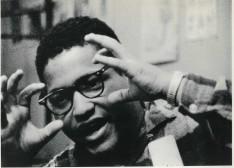No Vietnamese Ever Called Me N****r

No Vietnamese Ever Called Me N***r
Los Angeles Filmforum presents
No Vietnamese Ever Called Me N****r
Sunday, July 1, 2018, 7:30 pm
At the Spielberg Theatre at the Egyptian, 6712 Hollywood Blvd., Los Angeles, CA 90028
1968: Visions of Possibilities, part 4
Directed by labor organizer and New York Times typesetter David Weiss, this film spotlights African American responses to the Vietnam War through street interviews captured during the Spring Mobilization Committee to End the War in Vietnam’s April 15, 1967, New York City march. The city-wide protest march, culminating at the United Nations, attracted over half a million participants including Martin Luther King, Jr., Harry Belafonte, Dr. Benjamin Spock, and Kwame Ture (né Stokely Carmichael). Interwoven among the protest footage is an interview with three black veterans, recently returned from Vietnam in 1968.
Filmed by a crew of six (including noted cinematographer and WOODSTOCK director, Michael Wadleigh), the film’s gritty hand-held street cinematography and intimate veteran testimonials provide a radical perspective on the plight of returning black G.I.s – disproportionately sent to fight the war overseas, returning home to a “Thank You” of continued racial and economic discrimination. The film was produced and distributed by the short-lived Paradigm Films, who were soon to release auteur Jim McBride’s first features, DAVID HOLZMAN’S DIARY and MY GIRLFRIEND’S WEDDING.
Preserved through a collaboration between Anthology Film Archives and the Smithsonian’s National Museum of African American History and Culture, supported by the Robert F. Smith Fund. Special thanks to Cinema Guild, John Binder, Walter Forsberg (NMAAHC), and Chris Hughes & Laura Major (Colorlab). A Cinema Guild release.
1968: Visions of Possibilities: Over the course of the year, Filmforum will present a variety of films reflecting the turbulent global events of 1968, films made in that time, and works reflecting on the long-term effects and disappointments of the activist efforts and violent responses. From the assassinations of Martin Luther King, Jr and Robert Kennedy to the Democratic Convention and 1968 presidential election in the US, to the strikes in France in May and the Prague Spring and Soviet crushing of it, these films of and on 1968 utilize many voices and techniques to show an era that seemed lost but perhaps now cycles back to our consciousness and actions. Series curated by Adam Hyman
INFO: www.lafilmforum.org , 323-377-7238
Tickets: $10 general; $6 students/seniors, Free for Filmforum members. Available in advance at https://novietnamese.bpt.me
No Vietnamese Ever Called Me N***r
No Vietnamese Ever Called Me N***r
Directed by David Loeb Weiss
1968, b&w, sound, 16mm restored transferred to 4K digital, 68 minutes
Outstanding Film Citation, Chicago Film Festival
Best Documentary, Mannheim Film Festival
“The movie’s title, itself a potent form of political enlightenment, was taken from the printed placards that the SNCC marchers carried — although the sentiment is so closely associated with Muhammad Ali, who refused induction into the Army on April 28, 1967, but never actually said it, that some assumed that Weiss’s movie was about Ali. It’s not but it also packs a wallop.” –
J. Hoberman review in the NY Times
"The strongest statement yet from the black community...a startling cry of rage and despair."--Open City (Los Angeles), 1968
Director David Loeb Weiss was a life-long revolutionist and former Socialist Action member, Weiss was born into a working-class immigrant Jewish family from Poland. He grew up on New York’s Lower East Side, where radical politics and Eastern European Yiddish culture met. In his life David was a busboy, waiter, shipyard worker, farm hand, factory worker, and radar-man in World War II. Weiss retired in 1978 after 18 years as a proofreader at The New York Times. In the 1960s, he studied filmmaking and became an award-winning documentary filmmaker. David was raised in a political family. Both parents were members of the Stalinized Communist Party (CP). By trade his father was a tailor and Yiddish actor; his mother a garment worker.
In his youth David and his brother Murray rode the rails coast to coast three times. David reenacted for me the time he shouted at his brother to get him to leap between moving cars to evade railroad security, “Jump, you yellow-bellied bastard!” The frightened Murray jumped, and they made it to California. Murray changed David’s life when he introduced him to a follower of Russian revolutionary Leon Trotsky. They read a pamphlet explaining the political outlook of the Trotskyists, and began to unlearn their parents’ anti-Trotskyist dogmas.
Later on, David organized clerks in the New York garment industry (1932); was an organizer of a New York hotel workers’ strike (1934), and a leader of the victorious Dura-Steel strike in Los Angeles (1937). He was an organizer of the Socialist Party (SP) in Los Angeles (1936), when Trotskyists were in the SP; and an SWP organizer in Youngstown, Chicago, and San
Francisco. In New York City in the early 1950s he was an SWP candidate for mayor and governor.
David’s first film, “Profile of a Peace Parade,” (1968) features interviews with antiwar New Yorkers at a large demonstration in Manhattan. Other documentaries were “Farewell, Etaoin Shrdu” (1980), which captured the last day of the linotype machine at The New York Times and its replacement by newer technology, and one about the Young Socialist Alliance, the SWP’s former youth group. He died in 2005 at the age of 94. – Obituary by Marty Goodman / October 2005 issue of Socialist Action newspaper,
